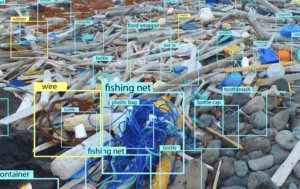
Drones are proving to be a critical tool for environmentalists. Now, a city in the U.K. is utilizing the sophisticated technology of Ellipsis Earth to address the problem of trash with drones.
Cities Today reports that a pilot program in Bournemouth, Christchurch and Poole (BCP) will use drone technology to deal with litter.
Local city government is partnering with environmental non-profit Hubbub and startup Ellipsis Earth to use drone data and AI-powered analytics to make decisions on where to place trash cans, how to set street cleaning schedules, and educate communities about litter.
The partners have called the pilot “the most scientifically robust litter survey ever undertaken in the UK”.
Drone imagery is processed by Ellipsis Earth software to automatically and rapidly detect discarded litter items and quantify them by type and brand to create litter heatmaps. This data, along with expert analysis and recommendations, will be shared with BCP council, Hubbub and McDonald’s, to help them better understand and prevent littering.
Ellipsis Earth began to capture data over beaches, parks, shopping streets and green space last month, using lightweight COTS drones. As COVI restrictions ease, the surveys will be repeated. “This data will inform a series of litter interventions over the course of the summer and a further survey will take place in July to assess whether they have been effective,” says the announcement.
The Ellipsis Earth platform is an elegant solution to an inelegant problem. The software analyzes aerial imagery, identifying plastics and further identifying the type of waste: differentiating between plastic bottles, fishing nets, bottle caps and toothbrushes to inform cleanup strategies.
“Using our custom machine learning, Ellipsis software can identify plastic with a 93% accuracy and 95% certainty. Our data is therefore globally comparable and scientifically robust, works in submerged water, with defected or degraded plastic, and in all terrains,” says Ellipsis Earth.
The project has proven results: in Sorrento, Italy, authorities say that they were able to use the data to institute strategies that have reduced trash “by 45 percent and cigarette butt waste by 69 percent,” says report.
Miriam McNabb is the Editor-in-Chief of DRONELIFE and CEO of JobForDrones, a professional drone services marketplace, and a fascinated observer of the emerging drone industry and the regulatory environment for drones. Miriam has penned over 3,000 articles focused on the commercial drone space and is an international speaker and recognized figure in the industry. Miriam has a degree from the University of Chicago and over 20 years of experience in high tech sales and marketing for new technologies.
For drone industry consulting or writing, Email Miriam.
TWITTER:@spaldingbarker
Subscribe to DroneLife here.